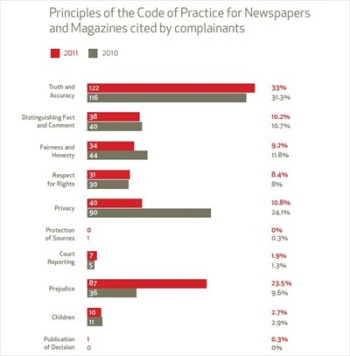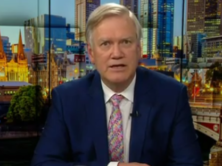
See above the Irish Press Council and Ombudsman's breakdown of 2011 complaints. (Credit: Ireland's Press Council & Ombudsman Annual Report, screenshot)
Ireland’s press ombudsman ruled in 42 cases last year, according to Ireland’s Press Council’s recently released annual report, published May 28.
One-third of the complaints to the press council last year were over “truth and accuracy,” and 10.8% of complaints were related to privacy, according to the report. Also, 10.2% addressed “distinguishing fact and comment.” (See the full breakdown on page 20 of the report).
While “there was a significant increase on last year in the number and percentage of complaints” about prejudice — “the publishing of material that is intended or likely to cause grave offense or stir up hatred,” press ombudsman Horgan noted that was because “two articles generated a total of 64 complaints.”
Most complaints to the council were over reports by national newspapers as opposed to magazines or local newspapers, according to the report.
The report noted that the press council and ombudsman were created in January 2007 and that the council consists of independent appointed members, who appoint the ombudsman. According to the annual report, newspapers must print “any decision of the Press Ombudsman or of the Press Council to uphold a complaint.”
Ireland’s Press Council also plans to look at the results of the UK Leveson Inquiry into press standards and practices and has “held talks with senior executives from Britain’s Press Complaints Commission,” according to Inside Ireland. According to an e-mail from Miriam Laffan, the PA/Administrator of the press council’s office, to iMediaEthics:
“Lord Hunt of the PCC and Michael McMahon, the transition manager, met the Chairman of the Press Council, Daithi O’Ceallaigh, and the Press Ombudsman, Professor John Horgan, on 3rd May for a wide-ranging discussion on matters of mutual interest. Lord Hunt and his colleague were on a two-day visit to Dublin in the course of which they also met the previous and current ministers for Justice, and explored aspects of press regulation in Ireland as enshrined in the 2009 Defamation Act and in the structures and powers of the Press Council of Ireland and the Press Ombudsman.”
The Press Council’s Chairman, Daithi O Ceallaigh, explained that “It goes without saying that any new ideas that emerge from Leveson will deserve careful consideration and evaluation by all concerned. The Press Council of Ireland will play its part in this at the appropriate time.” the Irish Independent reported.
Further, according to the Irish Times, Ireland’s Communications Minister Pat Rabbitte commented that “I don’t believe that some of the more odious practices exposed at the Leveson inquiry are present in Ireland.”
The Independent noted that OCeallaigh suggested Ireland’s press council might regulate online media as well. He is quoted as saying: “The values of journalism are not platform-specific and consumers of the new web-based media are also entitled to the best practice standards and to appropriate forms of redress.” According to the Press Council’s Miriam Laffan, “The council is currently considering a membership application from one Irish news website. There are no legal obstacles to recognizing news web-sites as members.”
UPDATED: 6/6/2012 10:28 AM EST: Added in responses from the Press Council of Ireland’s Miriam Laffan to iMediaEthics’ questions.





